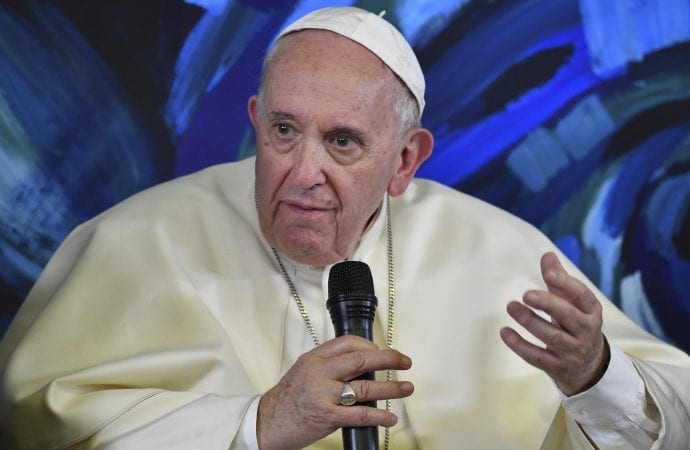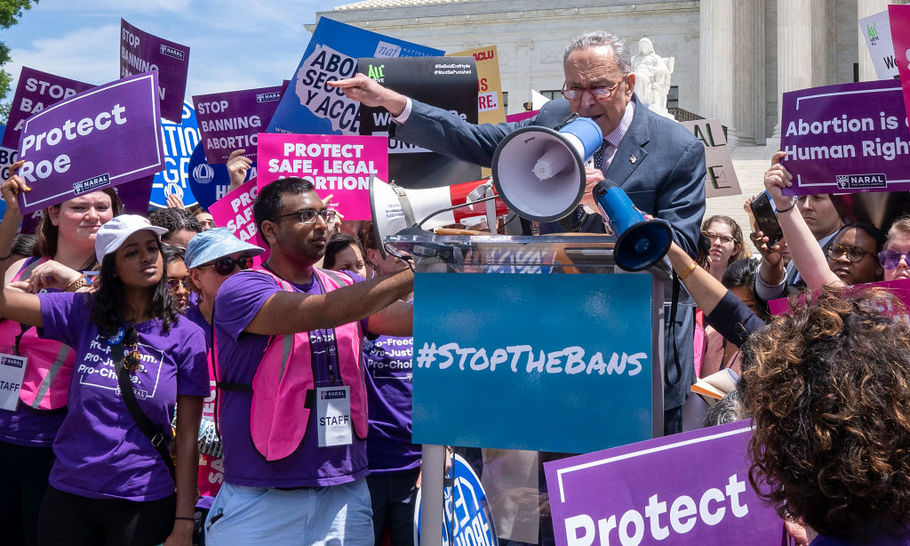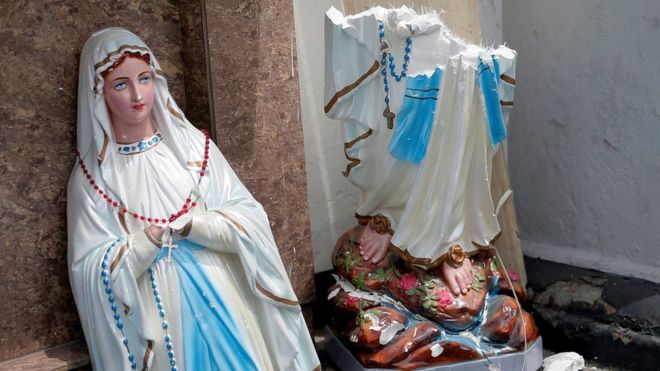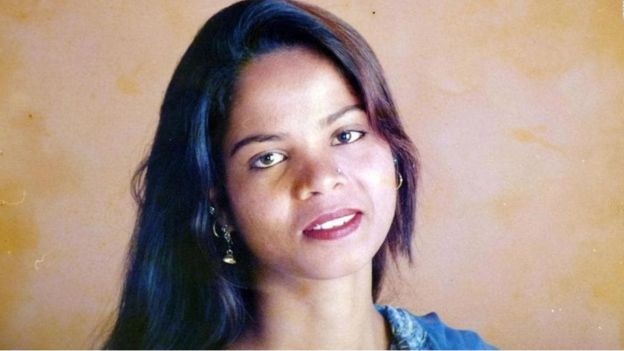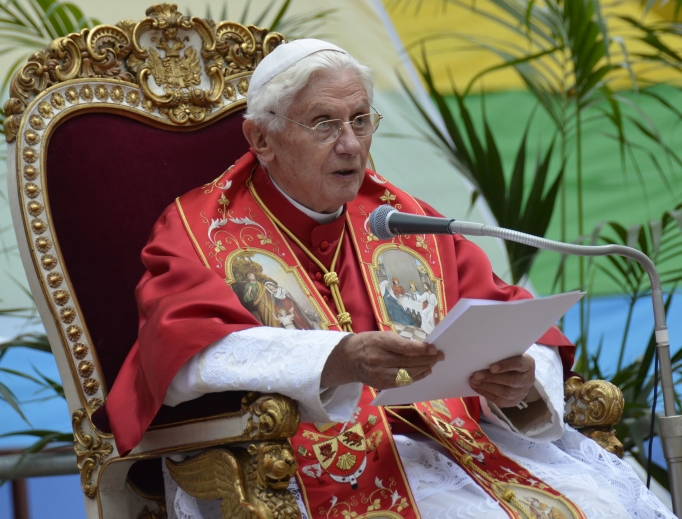On February 21 to 24, at the invitation of Pope Francis, the presidents of the world’s bishops’ conferences gathered at the Vatican to discuss the current crisis of the faith and of the Church; a crisis experienced throughout the world after shocking revelations of clerical abuse perpetrated against minors.
The extent and gravity of the reported incidents has deeply distressed priests as well as laity, and has caused more than a few to call into question the very Faith of the Church. It was necessary to send out a strong message, and seek out a new beginning, so to make the Church again truly credible as a light among peoples and as a force in service against the powers of destruction.
Since I myself had served in a position of responsibility as shepherd of the Church at the time of the public outbreak of the crisis, and during the run-up to it, I had to ask myself – even though, as emeritus, I am no longer directly responsible – what I could contribute to a new beginning.
Thus, after the meeting of the presidents of the bishops’ conferences was announced, I compiled some notes by which I might contribute one or two remarks to assist in this difficult hour.
Having contacted the Secretary of State, Cardinal [Pietro] Parolin and the Holy Father [Pope Francis] himself, it seemed appropriate to publish this text in the Klerusblatt [a monthly periodical for clergy in mostly Bavarian dioceses].
My work is divided into three parts.
In the first part, I aim to present briefly the wider social context of the question, without which the problem cannot be understood. I try to show that in the 1960s an egregious event occurred, on a scale unprecedented in history. It could be said that in the 20 years from 1960 to 1980, the previously normative standards regarding sexuality collapsed entirely, and a new normalcy arose that has by now been the subject of laborious attempts at disruption.
In the second part, I aim to point out the effects of this situation on the formation of priests and on the lives of priests.
Finally, in the third part, I would like to develop some perspectives for a proper response on the part of the Church.
I.
(1) The matter begins with the state-prescribed and supported introduction of children and youths into the nature of sexuality. In Germany, the then-Minister of Health, Ms. [Käte] Strobel, had a film made in which everything that had previously not been allowed to be shown publicly, including sexual intercourse, was now shown for the purpose of education. What at first was only intended for the sexual education of young people consequently was widely accepted as a feasible option.
Similar effects were achieved by the “Sexkoffer” published by the Austrian government [A controversial ‘suitcase’ of sex education materials used in Austrian schools in the late 1980s]. Sexual and pornographic movies then became a common occurrence, to the point that they were screened at newsreel theaters [Bahnhofskinos]. I still remember seeing, as I was walking through the city of Regensburg one day, crowds of people lining up in front of a large cinema, something we had previously only seen in times of war, when some special allocation was to be hoped for. I also remember arriving in the city on Good Friday in the year 1970 and seeing all the billboards plastered up with a large poster of two completely naked people in a close embrace.
Among the freedoms that the Revolution of 1968 sought to fight for was this all-out sexual freedom, one which no longer conceded any norms.
The mental collapse was also linked to a propensity for violence. That is why sex films were no longer allowed on airplanes because violence would break out among the small community of passengers. And since the clothing of that time equally provoked aggression, school principals also made attempts at introducing school uniforms with a view to facilitating a climate of learning.
Part of the physiognomy of the Revolution of ’68 was that pedophilia was then also diagnosed as allowed and appropriate.
For the young people in the Church, but not only for them, this was in many ways a very difficult time. I have always wondered how young people in this situation could approach the priesthood and accept it, with all its ramifications. The extensive collapse of the next generation of priests in those years and the very high number of laicizations were a consequence of all these developments.
(2) At the same time, independently of this development, Catholic moral theology suffered a collapse that rendered the Church defenseless against these changes in society. I will try to outline briefly the trajectory of this development.
Until the Second Vatican Council, Catholic moral theology was largely founded on natural law, while Sacred Scripture was only cited for background or substantiation. In the Council’s struggle for a new understanding of Revelation, the natural law option was largely abandoned, and a moral theology based entirely on the Bible was demanded.
I still remember how the Jesuit faculty in Frankfurt trained a highly gifted young Father (Bruno Schüller) with the purpose of developing a morality based entirely on Scripture. Father Schüller’s beautiful dissertation shows a first step towards building a morality based on Scripture. Father Schüller was then sent to America for further studies and came back with the realization that from the Bible alone morality could not be expressed systematically. He then attempted a more pragmatic moral theology, without being able to provide an answer to the crisis of morality.
In the end, it was chiefly the hypothesis that morality was to be exclusively determined by the purposes of human action that prevailed. While the old phrase “the end justifies the means” was not confirmed in this crude form, its way of thinking had become definitive. Consequently, there could no longer be anything that constituted an absolute good, any more than anything fundamentally evil; [there could be] only relative value judgments. There no longer was the [absolute] good, but only the relatively better, contingent on the moment and on circumstances.
The crisis of the justification and presentation of Catholic morality reached dramatic proportions in the late ’80s and ’90s. On January 5, 1989, the “Cologne Declaration,” signed by 15 Catholic professors of theology, was published. It focused on various crisis points in the relationship between the episcopal magisterium and the task of theology. [Reactions to] this text, which at first did not extend beyond the usual level of protests, very rapidly grew into an outcry against the Magisterium of the Church and mustered, audibly and visibly, the global protest potential against the expected doctrinal texts of John Paul II (cf. D. Mieth, Kölner Erklärung, LThK, VI3, p. 196) [LTHK is the Lexikon für Theologie und Kirche, a German-language “Lexicon of Theology and the Church,” whose editors included Karl Rahner and Cardinal Walter Kasper.]
Pope John Paul II, who knew very well the situation of moral theology and followed it closely, commissioned work on an encyclical that would set these things right again. It was published under the title “Veritatis splendor” on August 6, 1993, and it triggered vehement backlashes on the part of moral theologians. Before it, the “Catechism of the Catholic Church” already had persuasively presented, in a systematic fashion, morality as proclaimed by the Church.
I shall never forget how then-leading German moral theologian Franz Böckle, who, having returned to his native Switzerland after his retirement, announced in view of the possible decisions of the encyclical “Veritatis splendor” that if the encyclical should determine that there were actions which were always and under all circumstances to be classified as evil, he would challenge it with all the resources at his disposal.
It was God, the Merciful, that spared him from having to put his resolution into practice; Böckle died on July 8, 1991. The encyclical was published on August 6, 1993 and did indeed include the determination that there were actions that can never become good.
The pope was fully aware of the importance of this decision at that moment and for this part of his text, he had once again consulted leading specialists who did not take part in the editing of the encyclical. He knew that he must leave no doubt about the fact that the moral calculus involved in balancing goods must respect a final limit. There are goods that are never subject to trade-offs.
There are values which must never be abandoned for a greater value and even surpass the preservation of physical life. There is martyrdom. God is [about] more than mere physical survival. A life that would be bought by the denial of God, a life that is based on a final lie, is a non-life.
Martyrdom is a basic category of Christian existence. The fact that martyrdom is no longer morally necessary in the theory advocated by Böckle and many others shows that the very essence of Christianity is at stake here.
In moral theology, however, another question had meanwhile become pressing: The hypothesis that the Magisterium of the Church should have final competence (“infallibility”) only in matters concerning the faith itself gained widespread acceptance; (in this view) questions concerning morality should not fall within the scope of infallible decisions of the Magisterium of the Church. There is probably something right about this hypothesis that warrants further discussion. But there is a minimum set of morals which is indissolubly linked to the foundational principle of faith and which must be defended if faith is not to be reduced to a theory but rather to be recognized in its claim to concrete life.
All this makes apparent just how fundamentally the authority of the Church in matters of morality is called into question. Those who deny the Church a final teaching competence in this area force her to remain silent precisely where the boundary between truth and lies is at stake.
Independently of this question, in many circles of moral theology the hypothesis was expounded that the Church does not and cannot have her own morality. The argument being that all moral hypotheses would also know parallels in other religions and therefore a Christian property of morality could not exist. But the question of the unique nature of a biblical morality is not answered by the fact that for every single sentence somewhere, a parallel can also be found in other religions. Rather, it is about the whole of biblical morality, which as such is new and different from its individual parts.
The moral doctrine of Holy Scripture has its uniqueness ultimately predicated in its cleaving to the image of God, in faith in the one God who showed himself in Jesus Christ and who lived as a human being. The Decalogue is an application of the biblical faith in God to human life. The image of God and morality belong together and thus result in the particular change of the Christian attitude towards the world and human life. Moreover, Christianity has been described from the beginning with the word hodós [Greek for a road, in the New Testament often used in the sense of a path of progress].
Faith is a journey and a way of life. In the old Church, the catechumenate was created as a habitat against an increasingly demoralized culture, in which the distinctive and fresh aspects of the Christian way of life were practiced and at the same time protected from the common way of life. I think that even today something like catechumenal communities are necessary so that Christian life can assert itself in its own way.
II.
Initial Ecclesial Reactions
(1) The long-prepared and ongoing process of dissolution of the Christian concept of morality was, as I have tried to show, marked by an unprecedented radicalism in the 1960s. This dissolution of the moral teaching authority of the Church necessarily had to have an effect on the diverse areas of the Church. In the context of the meeting of the presidents of the episcopal conferences from all over the world with Pope Francis, the question of priestly life, as well as that of seminaries, is of particular interest. As regards the problem of preparation for priestly ministry in seminaries, there is in fact a far-reaching breakdown of the previous form of this preparation.
In various seminaries homosexual cliques were established, which acted more or less openly and significantly changed the climate in the seminaries. In one seminary in southern Germany, candidates for the priesthood and candidates for the lay ministry of the pastoral specialist [Pastoralreferent] lived together. At the common meals, seminarians and pastoral specialists ate together, the married among the laymen sometimes accompanied by their wives and children, and on occasion by their girlfriends. The climate in this seminary could not provide support for preparation to the priestly vocation. The Holy See knew of such problems, without being informed precisely. As a first step, an Apostolic Visitation was arranged of seminaries in the United States.
As the criteria for the selection and appointment of bishops had also been changed after the Second Vatican Council, the relationship of bishops to their seminaries was very different, too. Above all, a criterion for the appointment of new bishops was now their “conciliarity,” which of course could be understood to mean rather different things.
Indeed, in many parts of the Church, conciliar attitudes were understood to mean having a critical or negative attitude towards the hitherto existing tradition, which was now to be replaced by a new, radically open relationship with the world. One bishop, who had previously been seminary rector, had arranged for the seminarians to be shown pornographic films, allegedly with the intention of thus making them resistant to behavior contrary to the faith.
There were — not only in the United States of America — individual bishops who rejected the Catholic tradition as a whole and sought to bring about a kind of new, modern “Catholicity” in their dioceses. Perhaps it is worth mentioning that in not a few seminaries, students caught reading my books were considered unsuitable for the priesthood. My books were hidden away, like bad literature, and only read under the desk.
The Visitation that now took place brought no new insights, apparently because various powers had joined forces to conceal the true situation. A second Visitation was ordered and brought considerably more insights, but on the whole failed to achieve any outcomes. Nonetheless, since the 1970s the situation in seminaries has generally improved. And yet, only isolated cases of a new strengthening of priestly vocations came about as the overall situation had taken a different turn.
(2) The question of pedophilia, as I recall, did not become acute until the second half of the 1980s. In the meantime, it had already become a public issue in the U.S., such that the bishops in Rome sought help, since canon law, as it is written in the new (1983) Code, did not seem sufficient for taking the necessary measures.
Rome and the Roman canonists at first had difficulty with these concerns; in their opinion the temporary suspension from priestly office had to be sufficient to bring about purification and clarification. This could not be accepted by the American bishops, because the priests thus remained in the service of the bishop, and thereby could be taken to be [still] directly associated with him. Only slowly, a renewal and deepening of the deliberately loosely constructed criminal law of the new Code began to take shape.
In addition, however, there was a fundamental problem in the perception of criminal law. Only so-called guarantorism [a kind of procedural protectionism] was still regarded as “conciliar.” This means that above all the rights of the accused had to be guaranteed, to an extent that factually excluded any conviction at all. As a counterweight against the often-inadequate defense options available to accused theologians, their right to defense by way of guarantorism was extended to such an extent that convictions were hardly possible.
Allow me a brief excursus at this point. In light of the scale of pedophilic misconduct, a word of Jesus has again come to attention which says: “Whoever causes one of these little ones who believe in me to sin, it would be better for him if a great millstone were hung round his neck and he were thrown into the sea” (Mark 9:42).
The phrase “the little ones” in the language of Jesus means the common believers who can be confounded in their faith by the intellectual arrogance of those who think they are clever. So here Jesus protects the deposit of the faith with an emphatic threat of punishment to those who do it harm.
The modern use of the sentence is not in itself wrong, but it must not obscure the original meaning. In that meaning, it becomes clear, contrary to any guarantorism, that it is not only the right of the accused that is important and requires a guarantee. Great goods such as the Faith are equally important.
A balanced canon law that corresponds to the whole of Jesus’ message must therefore not only provide a guarantee for the accused, the respect for whom is a legal good. It must also protect the Faith, which is also an important legal asset. A properly formed canon law must therefore contain a double guarantee — legal protection of the accused, legal protection of the good at stake. If today one puts forward this inherently clear conception, one generally falls on deaf ears when it comes to the question of the protection of the Faith as a legal good. In the general awareness of the law, the Faith no longer appears to have the rank of a good requiring protection. This is an alarming situation which must be considered and taken seriously by the pastors of the Church.
I would now like to add, to the brief notes on the situation of priestly formation at the time of the public outbreak of the crisis, a few remarks regarding the development of canon law in this matter.
In principle, the Congregation of the Clergy is responsible for dealing with crimes committed by priests. But since guarantorism dominated the situation to a large extent at the time, I agreed with Pope John Paul II that it was appropriate to assign the competence for these offences to the Congregation for the Doctrine of the Faith, under the title “Delicta maiora contra fidem.”
This arrangement also made it possible to impose the maximum penalty, i.e., expulsion from the clergy, which could not have been imposed under other legal provisions. This was not a trick to be able to impose the maximum penalty, but is a consequence of the importance of the Faith for the Church. In fact, it is important to see that such misconduct by clerics ultimately damages the Faith.
Only where Faith no longer determines the actions of man are such offenses possible.
The severity of the punishment, however, also presupposes a clear proof of the offense — this aspect of guarantorism remains in force.
In other words, in order to impose the maximum penalty lawfully, a genuine criminal process is required. But both the dioceses and the Holy See were overwhelmed by such a requirement. We therefore formulated a minimum level of criminal proceedings and left open the possibility that the Holy See itself would take over the trial where the diocese or the metropolitan administration is unable to do so. In each case, the trial would have to be reviewed by the Congregation for the Doctrine of the Faith in order to guarantee the rights of the accused. Finally, in the Feria IV (i.e., the assembly of the members of the Congregation), we established an appeal instance in order to provide for the possibility of an appeal.
Because all of this actually went beyond the capacities of the Congregation for the Doctrine of the Faith, and because delays arose which had to be prevented owing to the nature of the matter, Pope Francis has undertaken further reforms.
III.
(1) What must be done? Perhaps we should create another Church for things to work out? Well, that experiment has already been undertaken and has already failed. Only obedience and love for our Lord Jesus Christ can point the way. So let us first try to understand anew and from within [ourselves] what the Lord wants, and has wanted with us.
First, I would suggest the following: If we really wanted to summarize very briefly the content of the Faith as laid down in the Bible, we might do so by saying that the Lord has initiated a narrative of love with us and wants to subsume all creation in it. The counterforce against evil, which threatens us and the whole world, can ultimately only consist in our entering into this love. It is the real counterforce against evil. The power of evil arises from our refusal to love God. He who entrusts himself to the love of God is redeemed. Our being not redeemed is a consequence of our inability to love God. Learning to love God is therefore the path of human redemption.
Let us now try to unpack this essential content of God’s revelation a little more. We might then say that the first fundamental gift that Faith offers us is the certainty that God exists.
A world without God can only be a world without meaning. For where, then, does everything that is come from? In any case, it has no spiritual purpose. It is somehow simply there and has neither any goal nor any sense. Then there are no standards of good or evil. Then only what is stronger than the other can assert itself. Power is then the only principle. Truth does not count, it actually does not exist. Only if things have a spiritual reason, are intended and conceived — only if there is a Creator God who is good and wants the good — can the life of man also have meaning.
That there is God as creator and as the measure of all things is first and foremost a primordial need. But a God who would not express Himself at all, who would not make Himself known, would remain an assumption and could thus not determine the form [Gestalt] of our life. For God to be really God in this deliberate creation, we must look to Him to express Himself in some way. He has done so in many ways, but decisively in the call that went to Abraham and gave people in search of God the orientation that leads beyond all expectation: God Himself becomes creature, speaks as man with us human beings.
In this way the sentence “God is” ultimately turns into a truly joyous message, precisely because He is more than understanding, because He creates — and is — love. To once more make people aware of this is the first and fundamental task entrusted to us by the Lord.
A society without God — a society that does not know Him and treats Him as non-existent — is a society that loses its measure. In our day, the catchphrase of God’s death was coined. When God does die in a society, it becomes free, we were assured. In reality, the death of God in a society also means the end of freedom, because what dies is the purpose that provides orientation. And because the compass disappears that points us in the right direction by teaching us to distinguish good from evil. Western society is a society in which God is absent in the public sphere and has nothing left to offer it. And that is why it is a society in which the measure of humanity is increasingly lost. At individual points it becomes suddenly apparent that what is evil and destroys man has become a matter of course.
That is the case with pedophilia. It was theorized only a short time ago as quite legitimate, but it has spread further and further. And now we realize with shock that things are happening to our children and young people that threaten to destroy them. The fact that this could also spread in the Church and among priests ought to disturb us in particular.
Why did pedophilia reach such proportions? Ultimately, the reason is the absence of God. We Christians and priests also prefer not to talk about God, because this speech does not seem to be practical. After the upheaval of the Second World War, we in Germany had still expressly placed our Constitution under the responsibility to God as a guiding principle. Half a century later, it was no longer possible to include responsibility to God as a guiding principle in the European constitution. God is regarded as the party concern of a small group and can no longer stand as the guiding principle for the community as a whole. This decision reflects the situation in the West, where God has become the private affair of a minority.
A paramount task, which must result from the moral upheavals of our time, is that we ourselves once again begin to live by God and unto Him. Above all, we ourselves must learn again to recognize God as the foundation of our life instead of leaving Him aside as a somehow ineffective phrase. I will never forget the warning that the great theologian Hans Urs von Balthasar once wrote to me on one of his letter cards. “Do not presuppose the triune God, Father, Son and Holy Spirit, but present them!”
Indeed, in theology God is often taken for granted as a matter of course, but concretely one does not deal with Him. The theme of God seems so unreal, so far removed from the things that concern us. And yet everything becomes different if one does not presuppose but present God. Not somehow leaving Him in the background, but recognizing Him as the center of our thoughts, words and actions.
(2) God became man for us. Man as His creature is so close to His heart that He has united himself with him and has thus entered human history in a very practical way. He speaks with us, He lives with us, He suffers with us and He took death upon Himself for us. We talk about this in detail in theology, with learned words and thoughts. But it is precisely in this way that we run the risk of becoming masters of faith instead of being renewed and mastered by the Faith.
Let us consider this with regard to a central issue, the celebration of the Holy Eucharist. Our handling of the Eucharist can only arouse concern. The Second Vatican Council was rightly focused on returning this sacrament of the Presence of the Body and Blood of Christ, of the Presence of His Person, of His Passion, Death and Resurrection, to the center of Christian life and the very existence of the Church. In part, this really has come about, and we should be most grateful to the Lord for it.
And yet a rather different attitude is prevalent. What predominates is not a new reverence for the presence of Christ’s death and resurrection, but a way of dealing with Him that destroys the greatness of the Mystery. The declining participation in the Sunday Eucharistic celebration shows how little we Christians of today still know about appreciating the greatness of the gift that consists in His Real Presence. The Eucharist is devalued into a mere ceremonial gesture when it is taken for granted that courtesy requires Him to be offered at family celebrations or on occasions such as weddings and funerals to all those invited for family reasons.
The way people often simply receive the Holy Sacrament in communion as a matter of course shows that many see communion as a purely ceremonial gesture. Therefore, when thinking about what action is required first and foremost, it is rather obvious that we do not need another Church of our own design. Rather, what is required first and foremost is the renewal of the Faith in the Reality of Jesus Christ given to us in the Blessed Sacrament.
In conversations with victims of pedophilia, I have been made acutely aware of this first and foremost requirement. A young woman who was a [former] altar server told me that the chaplain, her superior as an altar server, always introduced the sexual abuse he was committing against her with the words: “This is my body which will be given up for you.”
It is obvious that this woman can no longer hear the very words of consecration without experiencing again all the horrific distress of her abuse. Yes, we must urgently implore the Lord for forgiveness, and first and foremost we must swear by Him and ask Him to teach us all anew to understand the greatness of His suffering, His sacrifice. And we must do all we can to protect the gift of the Holy Eucharist from abuse.
(3) And finally, there is the Mystery of the Church. The sentence with which Romano Guardini, almost 100 years ago, expressed the joyful hope that was instilled in him and many others, remains unforgotten: “An event of incalculable importance has begun; the Church is awakening in souls.”
He meant to say that no longer was the Church experienced and perceived as merely an external system entering our lives, as a kind of authority, but rather it began to be perceived as being present within people’s hearts — as something not merely external, but internally moving us. About half a century later, in reconsidering this process and looking at what had been happening, I felt tempted to reverse the sentence: “The Church is dying in souls.”
Indeed, the Church today is widely regarded as just some kind of political apparatus. One speaks of it almost exclusively in political categories, and this applies even to bishops, who formulate their conception of the church of tomorrow almost exclusively in political terms. The crisis, caused by the many cases of clerical abuse, urges us to regard the Church as something almost unacceptable, which we must now take into our own hands and redesign. But a self-made Church cannot constitute hope.
Jesus Himself compared the Church to a fishing net in which good and bad fish are ultimately separated by God Himself. There is also the parable of the Church as a field on which the good grain that God Himself has sown grows, but also the weeds that “an enemy” secretly sown onto it. Indeed, the weeds in God’s field, the Church, are excessively visible, and the evil fish in the net also show their strength. Nevertheless, the field is still God’s field and the net is God’s fishing net. And at all times, there are not only the weeds and the evil fish, but also the crops of God and the good fish. To proclaim both with emphasis is not a false form of apologetics, but a necessary service to the Truth.
In this context it is necessary to refer to an important text in the Revelation of St. John. The devil is identified as the accuser who accuses our brothers before God day and night (Revelation 12:10). St. John’s Apocalypse thus takes up a thought from the center of the framing narrative in the Book of Job (Job 1 and 2, 10; 42:7-16). In that book, the devil sought to talk down the righteousness of Job before God as being merely external. And exactly this is what the Apocalypse has to say: The devil wants to prove that there are no righteous people; that all righteousness of people is only displayed on the outside. If one could hew closer to a person, then the appearance of his justice would quickly fall away.
The narrative in Job begins with a dispute between God and the devil, in which God had referred to Job as a truly righteous man. He is now to be used as an example to test who is right. Take away his possessions and you will see that nothing remains of his piety, the devil argues. God allows him this attempt, from which Job emerges positively. Now the devil pushes on and he says: “Skin for skin! All that a man has he will give for his life. But put forth thy hand now, and touch his bone and his flesh, and he will curse thee to thy face.” (Job 2:4f)
God grants the devil a second turn. He may also touch the skin of Job. Only killing Job is denied to him. For Christians it is clear that this Job, who stands before God as an example for all mankind, is Jesus Christ. In St. John’s Apocalypse the drama of humanity is presented to us in all its breadth.
The Creator God is confronted with the devil who speaks ill of all mankind and all creation. He says, not only to God but above all to people: Look at what this God has done. Supposedly a good creation, but in reality full of misery and disgust. That disparagement of creation is really a disparagement of God. It wants to prove that God Himself is not good, and thus to turn us away from Him.
The timeliness of what the Apocalypse is telling us here is obvious. Today, the accusation against God is, above all, about characterizing His Church as entirely bad, and thus dissuading us from it. The idea of a better Church, created by ourselves, is in fact a proposal of the devil, with which he wants to lead us away from the living God, through a deceitful logic by which we are too easily duped. No, even today the Church is not just made up of bad fish and weeds. The Church of God also exists today, and today it is the very instrument through which God saves us.
It is very important to oppose the lies and half-truths of the devil with the whole truth: Yes, there is sin in the Church and evil. But even today there is the Holy Church, which is indestructible. Today there are many people who humbly believe, suffer and love, in whom the real God, the loving God, shows Himself to us. Today God also has His witnesses (martyres) in the world. We just have to be vigilant in order to see and hear them.
The word martyr is taken from procedural law. In the trial against the devil, Jesus Christ is the first and actual witness for God, the first martyr, who has since been followed by countless others.
Today’s Church is more than ever a “Church of the Martyrs” and thus a witness to the living God. If we look around and listen with an attentive heart, we can find witnesses everywhere today, especially among ordinary people, but also in the high ranks of the Church, who stand up for God with their life and suffering. It is an inertia of the heart that leads us to not wish to recognize them. One of the great and essential tasks of our evangelization is, as far as we can, to establish habitats of Faith and, above all, to find and recognize them.
I live in a house, in a small community of people who discover such witnesses of the living God again and again in everyday life and who joyfully point this out to me as well. To see and find the living Church is a wonderful task which strengthens us and makes us joyful in our Faith time and again.
At the end of my reflections I would like to thank Pope Francis for everything he does to show us, again and again, the light of God, which has not disappeared, even today. Thank you, Holy Father!
(Benedict XVI)
Translated by Anian Christoph Wimmer.
Quotes from Scripture use Revised Standard Version Catholic Edition (RSVCE).
Source: www.ncregister.com

